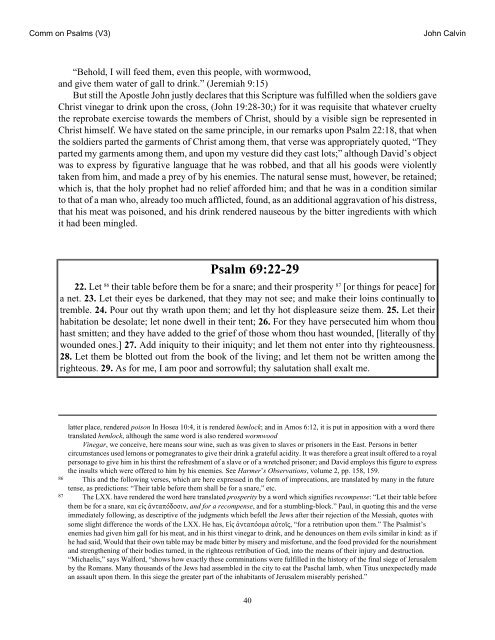Commentary on Psalms - Volume 3 - Bible Study Guides
Commentary on Psalms - Volume 3 - Bible Study Guides
Commentary on Psalms - Volume 3 - Bible Study Guides
- No tags were found...
You also want an ePaper? Increase the reach of your titles
YUMPU automatically turns print PDFs into web optimized ePapers that Google loves.
Comm <strong>on</strong> <strong>Psalms</strong> (V3)John Calvin“Behold, I will feed them, even this people, with wormwood,and give them water of gall to drink.” (Jeremiah 9:15)But still the Apostle John justly declares that this Scripture was fulfilled when the soldiers gaveChrist vinegar to drink up<strong>on</strong> the cross, (John 19:28-30;) for it was requisite that whatever crueltythe reprobate exercise towards the members of Christ, should by a visible sign be represented inChrist himself. We have stated <strong>on</strong> the same principle, in our remarks up<strong>on</strong> Psalm 22:18, that whenthe soldiers parted the garments of Christ am<strong>on</strong>g them, that verse was appropriately quoted, “Theyparted my garments am<strong>on</strong>g them, and up<strong>on</strong> my vesture did they cast lots;” although David’s objectwas to express by figurative language that he was robbed, and that all his goods were violentlytaken from him, and made a prey of by his enemies. The natural sense must, however, be retained;which is, that the holy prophet had no relief afforded him; and that he was in a c<strong>on</strong>diti<strong>on</strong> similarto that of a man who, already too much afflicted, found, as an additi<strong>on</strong>al aggravati<strong>on</strong> of his distress,that his meat was pois<strong>on</strong>ed, and his drink rendered nauseous by the bitter ingredients with whichit had been mingled.Psalm 69:22-2922. Let 86 their table before them be for a snare; and their prosperity 87 [or things for peace] fora net. 23. Let their eyes be darkened, that they may not see; and make their loins c<strong>on</strong>tinually totremble. 24. Pour out thy wrath up<strong>on</strong> them; and let thy hot displeasure seize them. 25. Let theirhabitati<strong>on</strong> be desolate; let n<strong>on</strong>e dwell in their tent; 26. For they have persecuted him whom thouhast smitten; and they have added to the grief of those whom thou hast wounded, [literally of thywounded <strong>on</strong>es.] 27. Add iniquity to their iniquity; and let them not enter into thy righteousness.28. Let them be blotted out from the book of the living; and let them not be written am<strong>on</strong>g therighteous. 29. As for me, I am poor and sorrowful; thy salutati<strong>on</strong> shall exalt me.latter place, rendered pois<strong>on</strong> In Hosea 10:4, it is rendered hemlock; and in Amos 6:12, it is put in appositi<strong>on</strong> with a word theretranslated hemlock, although the same word is also rendered wormwoodVinegar, we c<strong>on</strong>ceive, here means sour wine, such as was given to slaves or pris<strong>on</strong>ers in the East. Pers<strong>on</strong>s in bettercircumstances used lem<strong>on</strong>s or pomegranates to give their drink a grateful acidity. It was therefore a great insult offered to a royalpers<strong>on</strong>age to give him in his thirst the refreshment of a slave or of a wretched pris<strong>on</strong>er; and David employs this figure to expressthe insults which were offered to him by his enemies. See Harmer’s Observati<strong>on</strong>s, volume 2, pp. 158, 159.86 This and the following verses, which are here expressed in the form of imprecati<strong>on</strong>s, are translated by many in the futuretense, as predicti<strong>on</strong>s: “Their table before them shall be for a snare,” etc.87 The LXX. have rendered the word here translated prosperity by a word which signifies recompense: “Let their table beforethem be for a snare, και είς ἀνταπόδοσιν, and for a recompense, and for a stumbling-block.” Paul, in quoting this and the verseimmediately following, as descriptive of the judgments which befell the Jews after their rejecti<strong>on</strong> of the Messiah, quotes withsome slight difference the words of the LXX. He has, Εἰς ἀνταπόομα αὐτοῖς, “for a retributi<strong>on</strong> up<strong>on</strong> them.” The Psalmist’senemies had given him gall for his meat, and in his thirst vinegar to drink, and he denounces <strong>on</strong> them evils similar in kind: as ifhe had said, Would that their own table may be made bitter by misery and misfortune, and the food provided for the nourishmentand strengthening of their bodies turned, in the righteous retributi<strong>on</strong> of God, into the means of their injury and destructi<strong>on</strong>.“Michaelis,” says Walford, “shows how exactly these comminati<strong>on</strong>s were fulfilled in the history of the final siege of Jerusalemby the Romans. Many thousands of the Jews had assembled in the city to eat the Paschal lamb, when Titus unexpectedly madean assault up<strong>on</strong> them. In this siege the greater part of the inhabitants of Jerusalem miserably perished.”40
















